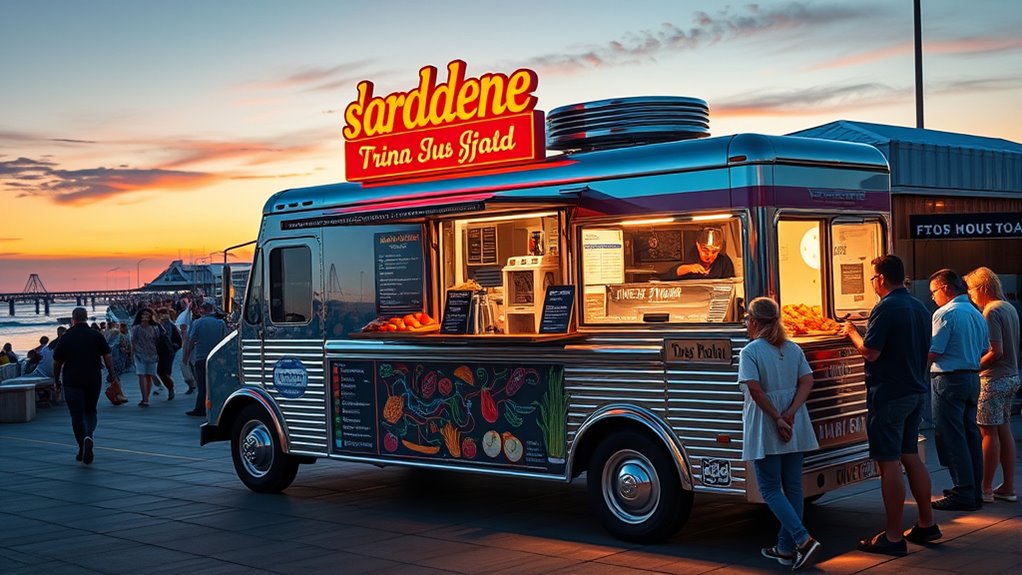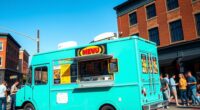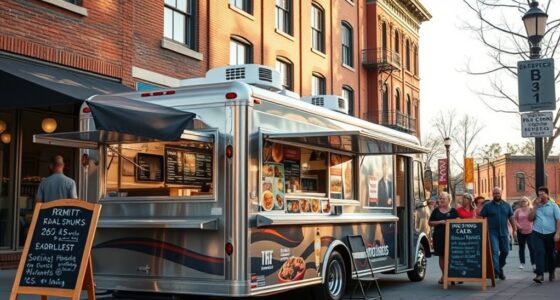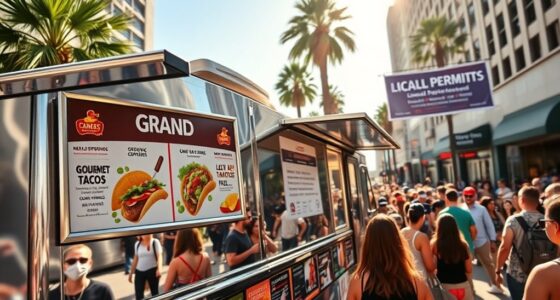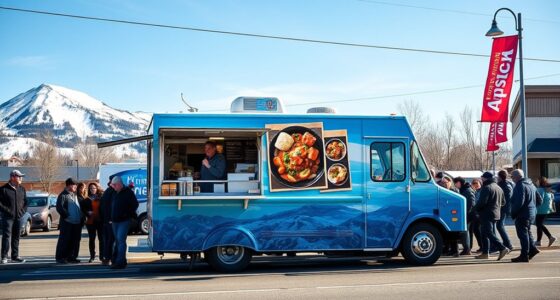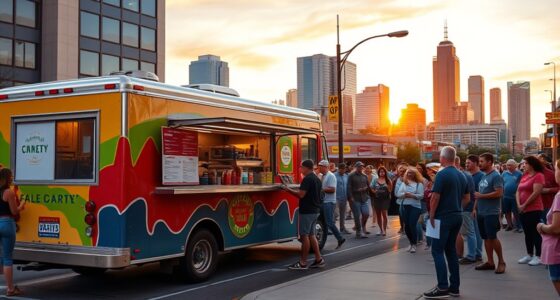To open a food truck in Virginia Beach, you’ll need to secure several permits, including business licenses, health permits, and fire safety clearance, which can cost a few hundred dollars. Choose high-traffic locations like the boardwalk or downtown, and create a menu featuring local favorites to attract customers. Budget around $15,000 to $45,000 for your truck and setup, plus plan effective marketing using social media and community events. If you want practical tips for launching, you’ll find useful insights ahead.
Key Takeaways
- Obtain necessary permits including business license, health permits, fire safety clearance, and vendor/location permits, with renewal requirements.
- Budget for truck purchase ($15,000–$150,000), equipment, initial inventory ($2,000–$3,000), and marketing ($3,000–$5,000).
- Prime locations include beach boardwalk, downtown, convention center, shopping districts, and university campuses for high visibility.
- Use social media platforms and community events to promote your food truck, collaborate with local influencers, and participate in festivals.
- Ensure compliance with zoning, health, and fire regulations; maintain cleanliness, safety standards, and adapt menus to local tastes and seasonal ingredients.
Navigating Permits and Licenses in Virginia Beach
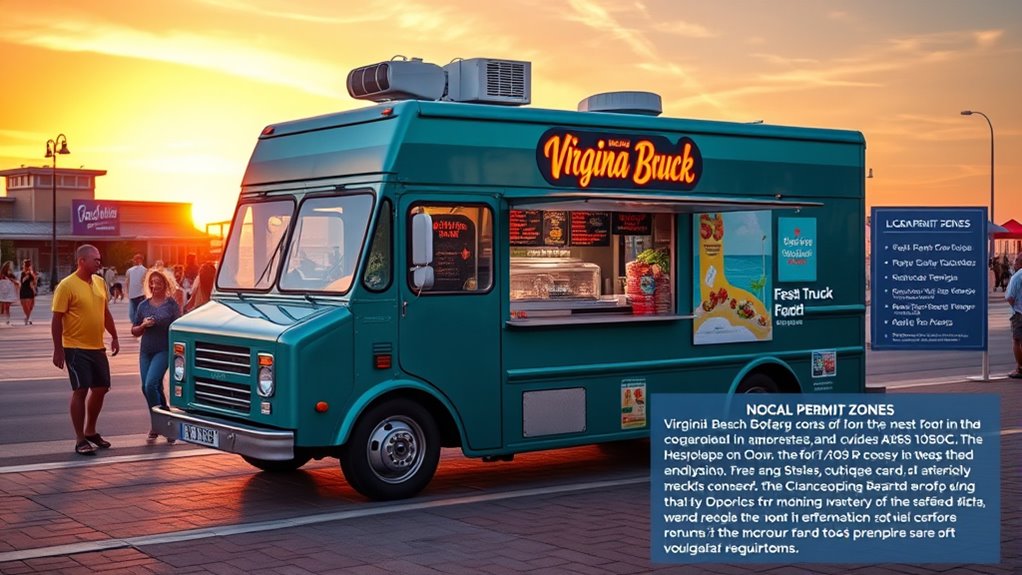
Managing permits and licenses in Virginia Beach can seem overwhelming, but understanding the key requirements makes the process more manageable. First, you’ll need a health permit, which involves a plan review with the local Environmental Health Department to meet safety standards. A Certified Food Safety Manager (CFSM) certification is also mandatory for safe food handling. You’ll need a business license from the Commissioner of the Revenue, with costs based on your gross receipts. Fire safety is essential, so expect a fire inspection and decal from the Virginia State Fire Marshal’s Office. Additionally, you must obtain a vendor parking permit for operating in designated areas. Meeting local regulations like zoning approval, state tax ID, and vehicle registration is vital. Staying organized and aware of these permits ensures your food truck remains compliant and ready to serve. Obtaining the necessary permits early helps prevent delays in launching your business and ensures you stay compliant with all local regulations. Incorporating up-to-date fraud detection techniques can further protect your business from potential financial risks as you grow.
Estimating Costs for Starting Your Food Truck Business
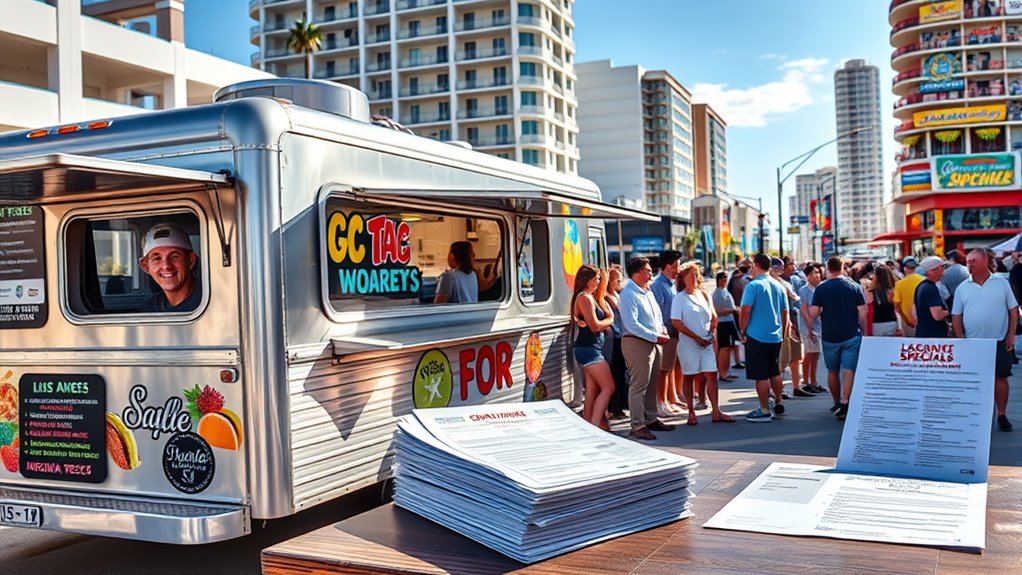
To start your food truck business, you’ll need to estimate your initial costs, including the truck purchase, supplies, and permits. Keep in mind that permit and licensing fees in Virginia Beach can vary, impacting your overall budget. Planning for ongoing operational and marketing expenses helps guarantee your business stays profitable. Additionally, understanding the local regulations and city ordinances is crucial to avoid unexpected expenses and ensure compliance. It’s also important to consider cookie consent management and how digital privacy policies might affect your online presence and customer engagement.
Startup Expenses Breakdown
Starting a food truck business involves careful planning of your initial expenses, which can vary widely based on your choices. The truck itself is a major cost, ranging from $15,000 to $150,000 depending on whether you buy used or new, and how much customization you need. Equipment expenses typically run around $45,000 for essentials like cooking appliances, refrigeration, and serving gear. Initial inventory costs are about $2,000 to $3,000, depending on your menu. Don’t forget ongoing costs—fuel and maintenance can be $500 to $1,000 monthly. You’ll also need to budget for marketing, which can be $3,000 to $5,000 upfront, and staffing, likely around $6,000 for two employees. Miscellaneous expenses cover serveware and operational supplies, rounding out your startup costs. Proper planning ensures you account for all potential expenses and avoid unexpected financial setbacks. Additionally, understanding projector technology such as contrast ratios and color accuracy can help you make informed decisions when selecting equipment or setting up a space for display purposes.
Permit and Licensing Fees
Understanding the permit and licensing fees is essential for accurately estimating your startup costs when launching a food truck in Virginia Beach. You’ll face application fees ranging from $50 to $100 for vendor permits, which are non-refundable regardless of approval. Expect health department inspection fees between $100 and $300, plus an annual $40 renewal for your food service permit. If you plan to sell on public right-of-way, a $50 peddler’s license is required. Business licenses cost around $50 if your gross receipts stay under $100,000, with higher fees applying for larger revenues. Additional location or event permits, such as parking or special event licenses, can add $75 to $150 per event. Fees vary based on location, season, and specific operational needs, making careful planning essential. Applying early for these permits can help avoid delays in your startup timeline. It’s also helpful to review any local regulations related to mobile food operations to ensure full compliance.
Operational and Marketing Costs
Estimating operational and marketing costs helps you create a realistic budget for launching your food truck. Your initial investment can range from $50,000 to $250,000, depending on vehicle choice and equipment. Vehicle costs vary: new trucks cost $50,000–$100,000, used ones $15,000–$50,000. Insurance costs run $2,000–$4,000 annually, while fuel and maintenance start at $500–$1,000. Inventory and serveware add another $2,300–$3,300. Marketing expenses include branding, social media, print materials, and event participation, which can considerably vary. Use this table to estimate costs:
| Cost Type | Range | Notes |
|---|---|---|
| Vehicle | $15,000–$100,000 | New vs. used |
| Insurance | $2,000–$4,000/year | Based on coverage |
| Marketing | Varies | Branding, promotions, print materials |
| Initial Supplies | $2,800–$3,300 | Inventory and serveware |
Additionally, considering space management strategies can optimize your truck’s interior for efficiency and safety.
Choosing Prime Locations for Your Food Truck Operation
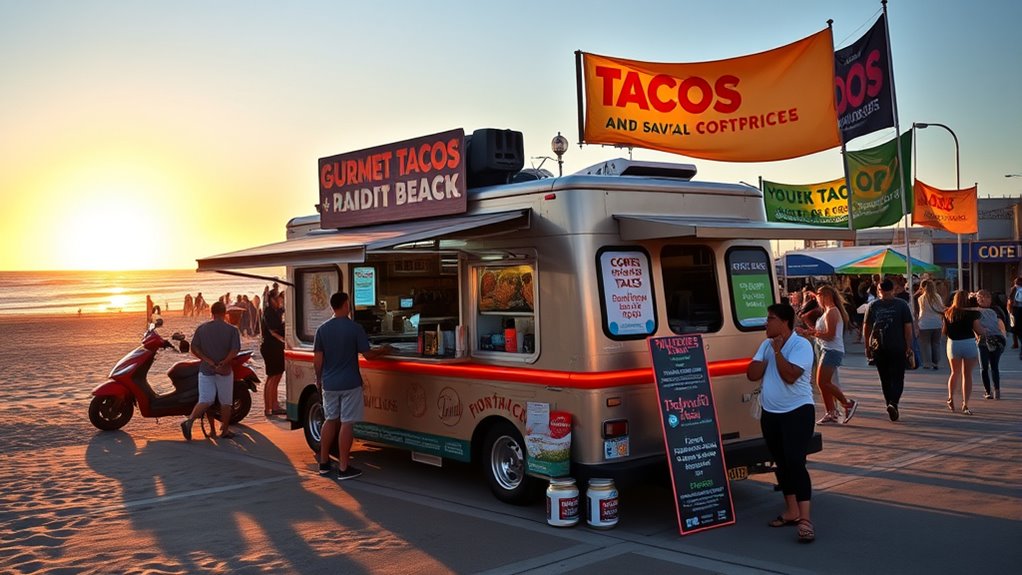
Choosing the right locations is essential for your food truck’s success in Virginia Beach. Beachfront areas like near the boardwalk draw heavy foot traffic and a diverse crowd, making them ideal for high visibility. Event venues such as the Virginia Beach Convention Center attract festival-goers and attendees, providing consistent crowds during events. Shopping districts like Lynnhaven and Pembroke Malls see steady customers seeking quick meals, perfect for lunch rushes. Downtown Virginia Beach buzzes with activity, especially during weekends and lunch hours, offering excellent opportunities. Additionally, local universities like Old Dominion University generate high demand from students seeking convenient food options. By selecting these prime spots, you’ll maximize your reach, increase sales, and establish a strong presence in the Virginia Beach food scene. Virginia Beach’s vibrant food truck scene offers numerous opportunities for entrepreneurs to tap into a steady customer base. Establishing a strategic presence in prime locations not only boosts visibility but also enhances your brand recognition among locals and tourists alike.
Crafting a Menu That Meets Local Tastes and Regulations
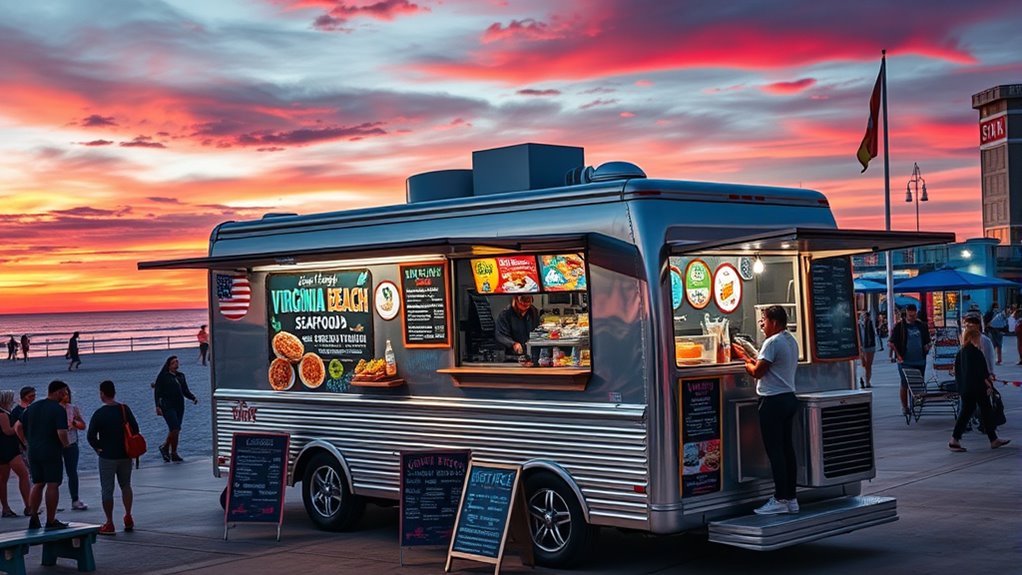
Creating a menu that appeals to local tastes and complies with regulations is essential for your Virginia Beach food truck’s success. Incorporate local ingredients like fresh seafood and meats to attract customers and support the community. Highlight Virginia favorites such as pulled pork or Brunswick stew to connect with locals. Offer seasonal specials based on locally available produce to keep your menu fresh and exciting. Guarantee all menu items meet Virginia Department of Health standards by following strict food safety and handling procedures. Regularly participate in health inspections and maintain high cleanliness standards. Partner with local farms and suppliers to source fresh ingredients, promoting local products and building trusted relationships. Adapting your menu to include trending food safety practices ensures ongoing compliance and customer confidence. Adapt your menu during local events and holidays to boost appeal and stay relevant. Researching local tastes and ingredients helps tailor your menu effectively.
Effective Marketing Strategies to Grow Your Food Truck Brand
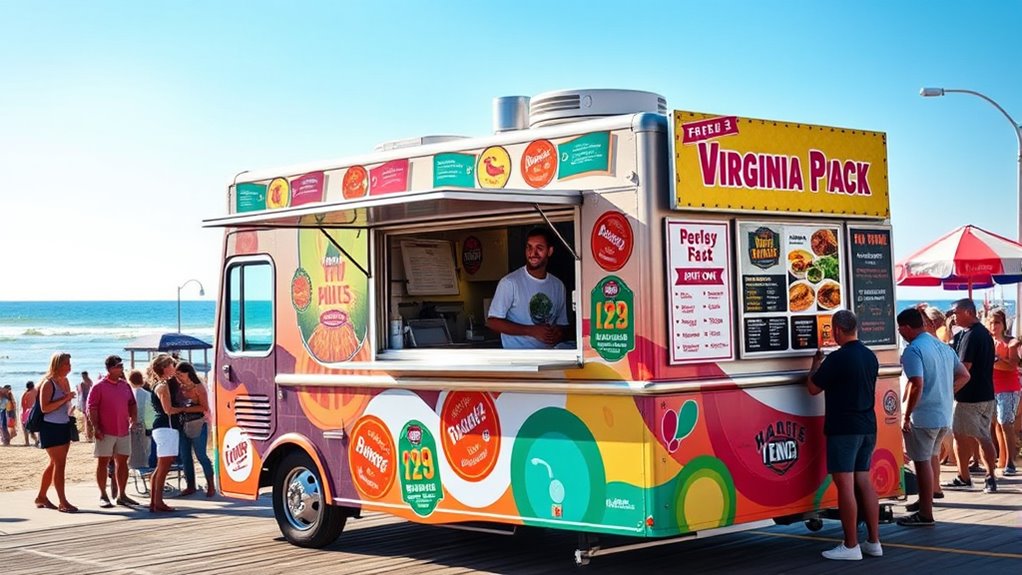
To grow your food truck brand in Virginia Beach, leveraging social media campaigns can boost your visibility and attract loyal customers. Sponsoring local events puts your truck in front of a broader audience and builds community connections. Partnering with other local businesses for collaborations can expand your reach and create memorable experiences for customers. Additionally, participating in or hosting local hackathons can foster community engagement and generate innovative marketing ideas.
Social Media Campaigns
Leveraging social media campaigns is essential for expanding your food truck’s reach and building a loyal customer base in Virginia Beach. Focus on platforms like Instagram for eye-catching food photos and behind-the-scenes reels, and use Facebook to promote events and foster community. Twitter helps with real-time updates and customer interactions, while YouTube showcases cooking demonstrations. TikTok allows you to craft engaging short videos and creative stories. Develop a content strategy that includes high-quality images, dynamic videos, behind-the-scenes stories, and location updates. Encourage customers to share their experiences through user-generated content. Respond to comments, host giveaways, and run polls to boost engagement. Use targeted hashtags, location tags, and branded hashtags to increase visibility and attract local followers. Consistency and branding across platforms are key to growth. Additionally, incorporating dog names that resonate with your brand personality can help create memorable marketing campaigns that stand out.
Local Event Sponsorships
Wondering how to boost your food truck’s visibility in Virginia Beach? Local event sponsorships are a powerful way to do it. You can get exposure through beach events, street festivals, and charity fundraisers, reaching diverse audiences and building community trust. Sponsoring the Virginia Beach Taco Festival or Street Food Festival places your brand in front of hungry attendees, while Touch-A-Truck offers family engagement. Costs vary depending on sponsorship level, from free options for nonprofits to $5,000 and up for larger events. Here’s a quick overview:
| Event Type | Sponsorship Benefits |
|---|---|
| Beach Events | Year-round exposure, diverse audiences |
| Touch-A-Truck | Family engagement, community involvement |
| Taco & Street Food Festivals | Brand visibility, local food enthusiasts |
| Charity Events | Supports causes, enhances community reputation |
Sponsoring local events builds your brand and creates lasting impressions. Annuities can be a useful financial tool to support your business’s long-term stability and growth.
Strategic Collaborations
Strategic collaborations are essential for expanding your food truck’s reach and building a strong brand presence in Virginia Beach. Partner with local influencers to boost your visibility by offering exclusive discounts and creating engaging social media content. Host influencer events or meet-and-greets to generate buzz. Engage with the community by participating in food festivals, collaborating with local businesses for joint promotions, and offering catering for local events. Build relationships with nearby suppliers for fresh ingredients and connect with customers through social media feedback. Implement loyalty programs using mobile apps to reward repeat customers and create a “secret menu” for loyal patrons. Utilize digital marketing tools like geotargeted ads and short-form videos to enhance brand awareness and track campaign success. Incorporating AI-powered analytics can further optimize your marketing strategies by providing insights into customer preferences and campaign performance.
Additional Requirements for a Smooth Launch

To guarantee your food truck launch goes smoothly, you’ll need to meet several important requirements. First, secure all necessary permits and licenses, including a business license from the Virginia Beach Commissioner of Revenue, health permits, and zoning approvals. Second, ensure your equipment and supplies meet local standards; this means investing in a custom-built truck with essential kitchen tools, refrigeration, and a commissary for storage and prep. Third, stay compliant with health regulations by establishing a written agreement with a commissary, conducting regular health inspections, and training staff annually. These steps create a solid foundation, helping you avoid delays and penalties. Meeting these requirements will streamline your launch and set your food truck up for long-term success. Additionally, understanding local zoning laws can prevent future operational hurdles and ensure your truck is parked legally at your chosen locations.
Tips for Maintaining Compliance and Growing Your Business
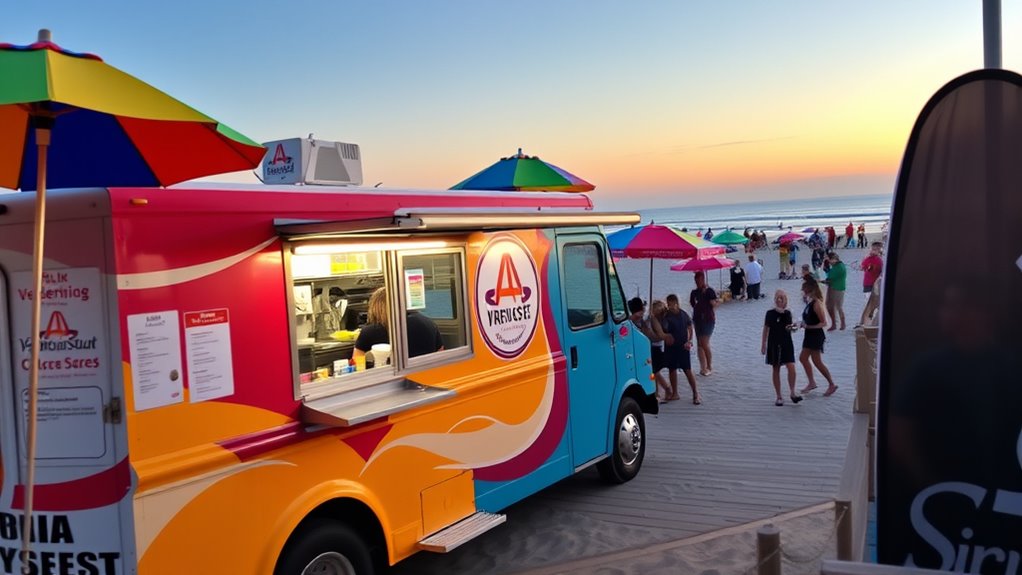
Maintaining compliance is essential for the long-term success of your food truck business, and staying proactive helps you avoid fines and operational disruptions. Regularly inspect your truck to meet health and safety standards, and keep detailed records of permits, inspections, and certifications. Stay updated on zoning, health, and fire regulations to ensure your operations remain legal. Remember to renew permits annually, like health stickers, to remain compliant. Conduct periodic compliance audits to identify and fix issues early. Additionally, adapting your marketing strategy is key to growth. Use social media to showcase your offerings, form local partnerships, and encourage customer feedback. Participating in community events and offering seasonal specials can boost visibility and customer loyalty, helping your business thrive. Understanding local regulations is crucial for avoiding legal issues and ensuring smooth operations.
Frequently Asked Questions
How Long Does It Typically Take to Obtain All Necessary Permits?
You’re probably wondering how long it takes to get all the necessary permits. Typically, it takes about 15-20 business days for your vendor permit, with an extra 7-10 days for the health department review if you’re selling food. Make sure your application is complete and submitted early, ideally 30 days before your planned start date. Pre-application consultations can help prevent delays and speed up the process.
Are There Specific Hours or Days When Food Trucks Are Restricted?
Did you know that nearly 60% of food trucks face restrictions on operating hours? In Virginia Beach, food trucks are generally limited from operating in residential areas and near schools during school hours, typically between 7 a.m. and 3 p.m. on weekdays. You’ll need to check local zoning rules and permits, as restrictions can vary by location. Always verify specific times with the city to avoid penalties.
Can I Operate My Food Truck in Multiple Locations Simultaneously?
You can operate your food truck in multiple locations, but you’ll need to secure permits for each spot. Check local zoning and parking rules, as some areas restrict multiple simultaneous operations. You might also need short-term event permits if you plan to move often. Always guarantee your permits are up to date and comply with Virginia Beach regulations to avoid fines or shutdowns. Planning ahead helps you maximize your truck’s reach safely.
What Are Common Mistakes to Avoid During the Licensing Process?
Steering the licensing maze can feel like threading a needle in a haystack. You might overlook renewal deadlines or forget to double-check local regulations, causing delays or fines. Don’t rush the paperwork; incomplete applications are like cracked foundations—fragile and problematic. Stay organized, verify every detail, and keep in close contact with authorities. Avoid these pitfalls, and your permit process will flow smoothly, paving the way for a successful food truck venture.
Are There Grants or Financial Assistance Programs Available for New Food Trucks?
You’ll find several grants and financial assistance programs tailored for new food trucks in Virginia Beach. Programs like the VBthrive Business Relief Grant and small business grants from VBDA can provide up to $10,000 for startup costs or expansion. Additionally, innovative food projects might qualify for grants through the Virginia Food Access Investment Fund. Be sure to check eligibility and application deadlines to secure funding that supports your food truck venture.
Conclusion
Starting your food truck in Virginia Beach is a real opportunity to hit the ground running. By handling permits, choosing the right location, and crafting a tasty menu, you’ll set yourself up for success. Keep marketing smart and stay on top of regulations to avoid running into rough waters. Remember, success doesn’t happen overnight, but with perseverance, you’ll be cooking up a storm and making waves in the local scene.
